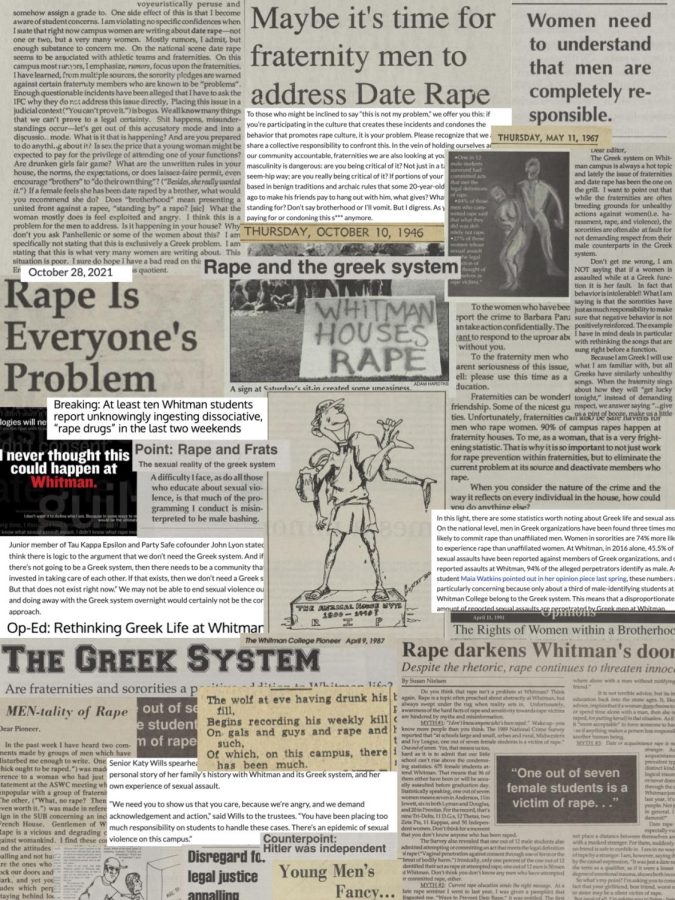I wanted to express my thoughts about the article published entitled “Residence Life Shuts Down Camp Whitman,” published in a recent edition of The Pio. While I understand it is unfortunate that underclassmen will find it more difficult to stay through commencement, I believe that this article does not fairly address the issue. I feel that the article was particularly shortsighted when it comes to why the decision was made to close the halls earlier than in previous years. I was a resident assistant in a first-year hall, so I experienced the logistics behind Camp Whitman first hand. ResLife’s first priority is always the safety and well-being of all residents, which become real concerns once students are given a week of downtime at the end of the semester. Instances of disruptive behavior during Camp Whitman have become significantly more prevalent over the past couple of years, and these instances become safety issues not only for those involved in the behavior, but also for those around them. Many students must travel home during this period and need to be well rested to do so safely.
I realize that what I’m saying is my opinion justifying the early closure of the residence halls, but I also take issue to how ResLife was portrayed in this article. ResLife is not a faceless entity whose goal it is to stop fun and tradition on the Whitman campus. Camp Whitman is not an organized event, but rather a very recent social trend on campus taking advantage of the fact that ResLife granted a few extra days for people to rest after finals period. Camp Whitman does not hinge on the fact that the residence halls are open for a few extra days––it is merely more convenient for people to party under the old policy, which is not why the halls are open through graduation in the first place. The article also included a quote implying that other Whitman traditions, such as beer mile and frat parties (which are also not official and not in any way tied to ResLife) will not occur at the end of the semester, which is simply false––beer mile occurs before finals week, which is indeed before Camp Whitman. The concern about giving students enough time to move out at the end of the semester is valid, but the residence halls are still open two days past finals, which I feel is a perfectly reasonable amount of time for such a task.
In summary, ResLife has not “shut down” Camp Whitman. Everyone is required to sign a contract at the end of the year requiring that they abide by ResLife rules after finals week, and these rules are established with the safety and well-being of all residents in mind. Those with legitimate reasons to stay a few extra days will be allowed to, which has always been ResLife’s policy. In fact, residents were technically required to leave campus the day after their last final before this recent policy change, but the majority of residents ignored this policy, taking advantage of the fact that ResLife has been flexible in accomodating the needs of residents. Please consider both sides of this issue in the future and understand the position that ResLife has been put in and that the responsibility is ultimately in the hands of the residents.
Signed,
Jeremy Schofield ’14








Anon • Feb 15, 2014 at 9:53 pm
I just don’t see which part of ResLife can possibly be labeled as “an all-encompassing enforcement arm.” Is it the part where they allow students to drink in the residence halls? How about holding open section meetings, having one-on-ones with residents, and encouraging section evaluations so that they keep a dialogue going? Or perhaps it’s the part where they lay down VERY basic ground rules for respectfully co-existing in close quarters with other people (being mindful of your volume out of consideration for others? How dare they make such egregious demands?). The fact is, disrespecting authority and endangering your own (and others’) safety has legit consequences in the “real world,” and getting a couple days in the residence hall taken away is so ridiculously trivial compared to what happens when you take this attitude in the workplace or your community. Camp Whitman has always been a privilege, not a right. It’s different from 4-day break because sticking around past finals is not a part of ResLife’s job, plain and simple. I know it sucks that everyone is punished for the actions of a few, but there’s that “real life†business rearing its ugly head. As far as I can tell, nobody in ResLife is dancing on the grave of Camp Whitman, it’s just the sad reality of what happens when their seriously chill authority starts to get trampled on. People need to quit freaking out and acting so entitled – maybe Camp Whitman would still be around if they had a different attitude.
'14 • Feb 14, 2014 at 2:00 pm
I’m sorry, but students “needing to be well rested to travel safely” is a pretty poor reason. ResLife at Whitman is ballooning into an all-encompassing enforcement arm of some fairly ridiculous policies. It facilitates institutional responses over students talking to each other about grievances. It says “we know best” in every aspect of living on campus, from how students ‘should’ schedule their time to when it’s unacceptable to be heard from the hallways. It ruthlessly underprepares students for the real world, instead saying, “no, it’s okay, we’ll stop anything that might offend the lowest common denominator.” Yes, students have been partying during ‘Camp Whitman,’ but how is that different from the 4-day break? Why is it so dangerous that students be able to enjoy their last time together for months, or for years, in a manner that they see fit? Yes, we’ll screw up, but if we’re not allowed to fail, then how will we learn?